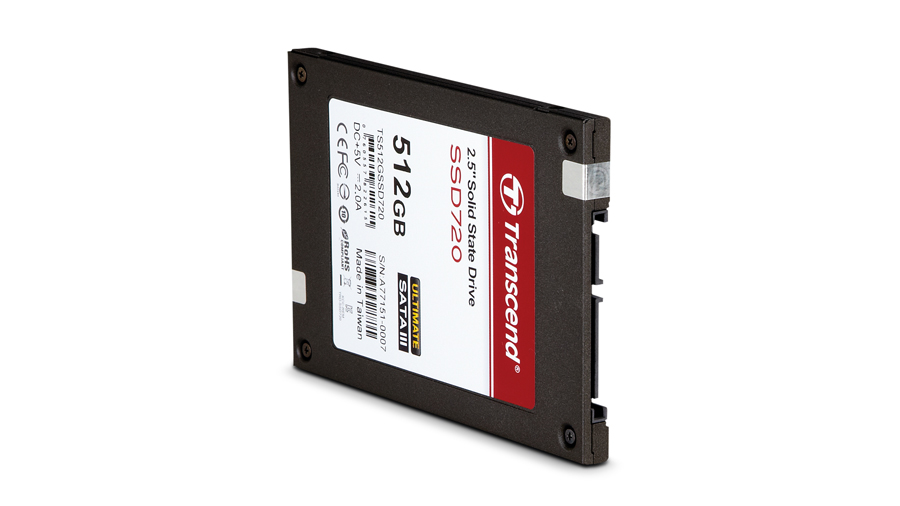TechRadar Verdict
Pros
- +
Good compressible data performance
- +
Decent sequential read/write
Cons
- -
SandForce controller showing age
- -
4K random writes not great
Why you can trust TechRadar
Transcend. Never heard of it? Actually, it's been in the memory game for longer than most, and was one of the very first outfits to flog solid state drives aimed at punters with PCs rather than just to big business.
Indeed, dig a little deeper and you'll find that the insides of the Transcend SSD720 series are pretty familiar. Perhaps a little too familiar.
The controller chipset is none other than the SandForce SF-2281. Of course, you might think it's a bit rich to talk about the SF-2281 as though it's at death's door. It's wasn't all that long ago we were hailing it as the greatest advance in solid state technology since the vacuum tube.
The problem is, progress is relentless, as is our understanding of what makes for a good SSD. And now we know that the SF-2281 has certain shortcomings.
Benchmarks
4K random read performance (incompressible)
AS SSD: Megabytes per second: Higher is better
A-Data XPG SX900 512GB: 23
Corsair Neutron GTX 240GB: 23
Crucial M500 480GB: 21
Intel 520 480GB: 24
OCZ Vertex 450 256GB: 19
Samsung 840 Pro 512GB: 26
Sandisk Extreme II 240GB: 23
Seagate 600 480GB: 22
Transcend SSD720 512GB: 20
Toshiba Q Series 256GB: 18
Zip file decompression
ZIP: Seconds: Quicker is better
A-Data XPG SX900 512GB: 23
Corsair Neutron GTX 240GB: 23
Crucial M500 480GB: 23
Intel 520 480GB: 24
OCZ Vertex 450 256GB: 23
Samsung 840 Pro 512GB: 24
Sandisk Extreme II 240GB: 23
Seagate 600 480GB: 23
Transcend SSD720 512GB: 24
Toshiba Q Series 256GB: 22
4K random write performance (incompressible)
AS SSD: Megabytes per second: Higher is better
A-Data XPG SX900 512GB: 18
Corsair Neutron GTX 240GB: 50
Crucial M500 480GB: 54
Intel 520 480GB: 19
OCZ Vertex 450 256GB: 54
Samsung 840 Pro 512GB: 51
Sandisk Extreme II 240GB: 54
Seagate 600 480GB: 44
Transcend SSD720 512GB: 18
Toshiba Q Series 256GB: 45
Sequential read performance (incompressible)
AS SSD: Megabytes per second: Higher is better
A-Data XPG SX900 512GB: 505
Corsair Neutron GTX 240GB: 503
Crucial M500 480GB: 492
Intel 520 480GB: 499
OCZ Vertex 450 256GB: 504
Samsung 840 Pro 512GB: 520
Sandisk Extreme II 240GB: 515
Seagate 600 480GB: 508
Transcend SSD720 512GB: 502
Toshiba Q Series 256GB: 514
Sequential read performance (compressible)
ATTO: Megabytes per second: Higher is better
A-Data XPG SX900 512GB: 551
Corsair Neutron GTX 240GB: 556
Crucial M500 480GB: 539
Intel 520 480GB: 545
OCZ Vertex 450 256GB: 551
Samsung 840 Pro 512GB: 561
Sandisk Extreme II 240GB: 555
Seagate 600 480GB: 554
Transcend SSD720 512GB: 538
Toshiba Q Series 256GB: 552
Sequential write performance (incompressible)
AS SSD: Megabytes per second: Higher is better
A-Data XPG SX900 512GB: 298
Corsair Neutron GTX 240GB: 470
Crucial M500 480GB: 414
Intel 520 480GB: 218
OCZ Vertex 450 256GB: 497
Samsung 840 Pro 512GB: 500
Sandisk Extreme II 240GB: 468
Seagate 600 480GB: 437
Transcend SSD720 512GB: 259
Toshiba Q Series 256GB: 469
Sequential write performance (compressible)
ATTO: Megabytes per second: Higher is better
A-Data XPG SX900 512GB: 519
Corsair Neutron GTX 240GB: 506
Crucial M500 480GB: 432
Intel 520 480GB: 475
OCZ Vertex 450 256GB: 534
Samsung 840 Pro 512GB: 535
Sandisk Extreme II 240GB: 518
Seagate 600 480GB: 473
Transcend SSD720 512GB: 465
Toshiba Q Series 256GB: 519
Verdict
Notably, it delivers its impressive peak performance numbers beyond the 500MB/s mark courtesy of data compression. Which is clever, except that much of the data you shunt around, like images and music and video, isn't compressible.
That explains why the Transcend SSD720 drops from 456MB/s to 259MB/s when you compare compressible and incompressible sequential write performance. That said, even 259MB/s is probably good enough in subjective computing terms.
Instead, it's the mediocre 4K random performance that really puts us off this drive. It's a metric where we'd like to have much more performance than even the fastest drives can manage, so the fact that the SSD720 is well off the pace, especially for 4K random writes, is approaching deal-breaker territory.
Technology and cars. Increasingly the twain shall meet. Which is handy, because Jeremy (Twitter) is addicted to both. Long-time tech journalist, former editor of iCar magazine and incumbent car guru for T3 magazine, Jeremy reckons in-car technology is about to go thermonuclear. No, not exploding cars. That would be silly. And dangerous. But rather an explosive period of unprecedented innovation. Enjoy the ride.
